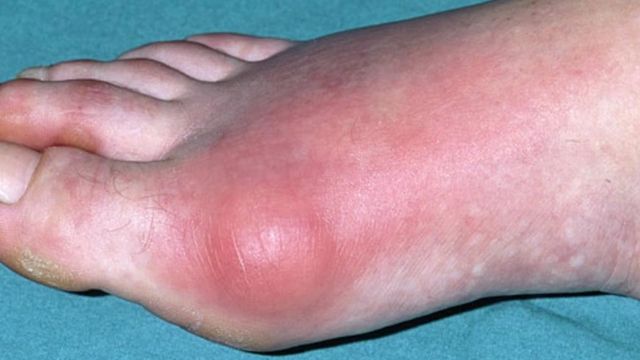Lose excess weight, drink plenty of water to ward off gout
Gout is one of the most frequently recorded medical illnesses throughout history. It is caused by a buildup of uric acid crystals in the joints.
Posted — UpdatedMany people experience episodes of excruciating pain in their joints, which can be related to arthritis.
Gout is one of the most frequently recorded medical illnesses throughout history. It is caused by a buildup of uric acid crystals in the joints.
Uric acid is a product of purines, which is found in high concentrations in meat and meat products. When the body can't get rid of all the uric acid, crystals form and accumulate in joints.
It can cause kidney stones or even lead to kidney failure, and it can come with a lot of pain.
A person's first experience with gout is typically at the base of the big toe. It's a rapid onset of pain followed by warmth, swelling, tenderness and reddish discoloration.
The pain may last for hours or days.
Other joints commonly affected include the ankles, knees, wrists, fingers and elbows.
The problem has risen over the last 20 years and now affects 8.3 million Americans, about 4 percent of the population.
Gout is more common in men than women, and African American men are at highest risk.
The risk also increases with age.
In women, gout attacks generally occur after menopause.
A family history of gout also increases your risk.
Lifestyle problems, such as obesity, excessive weight gain especially in youth, moderate to heavy alcohol intake, high blood pressure and abnormal kidney function play a big role with gout. Plus, certain drugs, such as diuretics, and diseases can elevate levels of uric acid in the body.
Gout is also more prevalent in patients with hypothyroidism, which is a low level of the thyroid hormone.
However, there are ways to help ward off gout.
Drink plenty of fluids every day, preferably water. Getting plenty of water will also decrease the risk of kidney stones in people with gout.
Alcohol acts like a diuretic, which flushes fluids out of the body, and increases the risk of gout.
Dietary changes are key, too: Cut back on foods rich in purines, such as shellfish and organ meats.
Consuming dairy products could reduce the risk.
Losing excess weight is also helpful for prevention, and it can help reduce attacks in patients with more chronic gout.
There are medications that can help ease the symptoms. For pain, doctors can prescribe anti-inflammatory medications like ibuprofen or indocin.
The standard medication for over 40 years was developed here in the Research Triangle Park, called allopurinol, which blocks the body's ability to produce uric acid.
About 9 years ago, Duke researchers developed a drug called PEG-uricase for patients who don't respond to allopurinol.
• Credits
Copyright 2024 by Capitol Broadcasting Company. All rights reserved. This material may not be published, broadcast, rewritten or redistributed.





